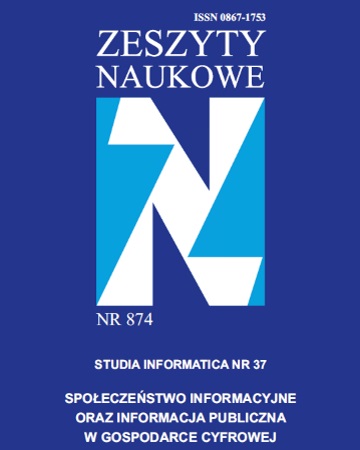
ISSN: 0867-1753
eISSN: 2300-410X
OAI
DOI: 10.18276/si.2015.37-08


Issue archive /
ZN 874 SI nr 37
Analiza zaawansowania realizacji idei open government data w wybranych krajach
(Advancement of implementing open government data in selected countries – an analysis)
| Authors: |
Joanna
Papińska-Kacperek
Uniwersytet Łódzki Krystyna Polańska Szkoła Główna Handlowa w Warszawie |
| Keywords: | open government data e-government open data |
| Data publikacji całości: | 2015 |
| Page range: | 12 (103-114) |
Abstract
The aim of the article is to introduce the idea of open data and to review Open Government Data in terms of their technical advancement. The analysis is done on the basis of classification developed by Timothy Berners-Lee, which allows for specifying the degree of technical sophistication of portals sharing open data. The article also highlights the costs of maintaining this type of portals and expected benefits of their launch. In the summary social effects of openness of public institutions to citizens were indicated and Polish local initiatives in this respect were presented.
Download file
Article file
Bibliography
| 1. | Bătăgan L. (2014), The Role of Open Government Data in Urban Areas Development, „Informatica Economică”, vol. 18, no. 2, www.revistaie.ase.ro/content/70/08%20-%20Batagan.pdf (20.03.2015). |
| 2. | Berners-Lee T. (2010), Is your Linked Open Data 5 Star?, www.w3.org/DesignIssues/LinkedData.html (20.03.2015). |
| 3. | CSC (2011), Uncharted Waters. The State of Open Data in Europe. |
| 4. | Dabbish L., Stuart C., Tsay J., Herbsleb J. (2012), Social coding in github: transparency and collaboration in an open software repository, w: Proceedings of the ACM 2012 conference on Computer Supported Cooperative Work, s. 1277–1286. |
| 5. | GitHub (2014), Who’s using GitHub?, https://government.github.com/community (13.03.2015). |
| 6. | GitHub (2011), Those are some big numbers, https://github.com/blog/841-those-aresome-big-numbers (13.03.2015). |
| 7. | Granickas K. (2013), Understanding the impact of releasing and re-using open government data, „European Public Sector In-formation Platform”, Topic Report no. 8, www.epsiplatform.eu/sites/default/files/2013-08-Open_Data_Impact.pdf (13.03.2015). |
| 8. | Janssen M., Charalabidis Y., Zuiderwijk A. (2012), Benefits, Adoption Barriers and Myths of Open Data and Open Government, „Information Systems Management”, vol. 29, no. 4, s. 258–268. |
| 9. | Kalapanidas E., Ramfos A. (2012), Position Paper submitted for the ‘Using Open Data: policy modeling, citizen empowerment, data journalism’ workshop, INTRASOFT International, www.w3.org/2012/06/pmod/pmod2012_submission_19.pdf (19.03.2015). |
| 10. | Logica Business Consulting (2012), Open data and use of standards: Towards a Better Supply and Distribution Process for Open Data, w: Standardization Forum, 14 April www.forumstandaardisatie.nl/fileadmin/os/documenten/Internationale_benchmark_v1_03_final. |
| 11. | Longo J., Kelley T.M. (2015), Use of GitHub in Public Administration in Canada: Open Government Innovation in Code, Web and Prose, „Canadian Public Administration”[w druku]. |
| 12. | Martin S., Foulonneau M., Turki S., Ihadjadene M. (2013), Risk Analysis to Over-come Barriers to Open Data, „Electronic Journal of e-Government”, vol. 11, Issue 1, www.ejeg.com/issue/download.html?idArticle=296 (16.03.2015). |
| 13. | Méli B. (2011), Open data: Etalab bénéficie d’un budget de 5 millions d’euros sur trois ans, JDN, www.journaldunet.com/ebusiness/le-net/budget-etalab-1111.shtml (19.03.2015). |
| 14. | Mergel I. (2014), Introducing Open Collaboration in the Public Sector: The Case of Social Coding on Github, Conference: European Group of Public Administration, At Speyer, DOI: 10.13140/2.1.2290.3047. |
| 15. | Papińska-Kacperek J. (2013), Usługi cyfrowe. Perspektywy wdrożenia i akceptacji cyfrowych usług administracji publicznej w Polsce, Wydawnictwo UŁ, Łódź. |
| 16. | Papińska-Kacperek J., Polańska K. (2015), Inicjatywy Open Government Data, „Roczniki Kolegium Analiz Ekonomicznych” [w druku]. |
| 17. | Parycek P., Sachs M. (2010), Open government-information flow in Web 2.0, „European Journal of ePractice”, no. 9 (1), s. 1–70. |
| 18. | Peterson K. (2013), The GitHub Open Source Development Process, Technical Report, Rochester, MN: Mayo Clinic. |
| 19. | Sobczak A., Kulisiewicz T. (2014), Analiza rozwiązań technologicznych pomocnych przy budowie Otwartego Rządu, Ośrodek Studiów nad Cyfrowym Państwem, Łódź. |
| 20. | Spinellis D. (2012), Git, „IEEE Software”, no. 29 (3), s. 100–101. |
| 21. | Tinholt D. (2013), The Open Data Economy Unlocking Economic Value by Opening Government and Public Data, Capgemini Consulting, http://www.capgemini-consulting.com/resource-file-access/resource/pdf/opendata_pov_6feb.pdf (13.03.2015). |
| 22. | Ubaldi B. (2013), Open Government Data: Towards Empirical Analysis of Open Government Data Initiatives, „OECD Working Papers on Public Governance”, no. 22, OECD. |